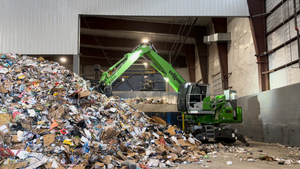What to Expect From Global Plastics Treaty Talks This Month
A mock proposal developed under the auspices of the Swiss government provides a preview of the restrictive policies that may prevail on a global scale.
April 14, 2024

The fourth gathering to negotiate a U.N.-driven global plastics treaty kicks off in Ottawa when the Intergovernmental Negotiating Committee (INC-4) begins deliberations on April 23.
INC-4, running through April 29, will be the last stage before a fifth session in Seoul in December that will decide the treaty’s final details. INC-4, however, comes on the heels of a third negotiating session that drew greatly mixed reviews.
According to a statement from the U.N. Environment Programme, the purpose of INC-4 is to “advance negotiations so that the committee can finalize, at its fifth session (INC-5), the text of an instrument that supports members in achieving their collective goal of ending plastic pollution and that can be effectively implemented.”
High stakes for plastics industry.
For the plastics industry, there is plenty at stake, with “high ambition” states pushing to codify language that will restrict or ban certain “problematic” plastics and chemicals from production.
Between INC-3 and INC-4, “it was clear that there is much interest in conducting intersessional work,” according to the U.N.’s post-INC-3 report. “At the same time, the need to be realistic about what can be undertaken between now and INC-4 was stressed, given the very limited time between INC-3 and INC-4, and the limited resources of the Secretariat. The Secretariat informed the contact group that the deadline for preparation of all documentation for INC-4 is 24 January 2024, and that no additional translation or interpretation resources would be available for meetings not already scheduled.”
Polymers of concern a hot topic.
Here’s what to watch for in the INC-4 negotiation round, based on the INC-3 post-session report as well as commentary from industry and environmental advocates.
Discussion of a broad range of topics, including chemicals and polymers of concern; problematic and avoidable plastic products, including intentionally added microplastic; primary plastic polymers; design and performance criteria; circularity of plastics; extended producer responsibility; waste management; fishing and aquaculture gear; and downstream underdeveloped countries.
Presentation of a working list of “clear, science-based” definitions related to plastics pollution, microplastics, circularity, and substances of concern in plastics;
A potential mandate for “establishment of a legal drafting group … to be launched at INC-4 — or later — to work during the INC, or intersessionally between INC-4 and INC-5, on final provisions for the instrument, taking into account exchanges and inputs shared at UNEP/PP/INC.3/5 28 INC-3. Further mandates might also be given to the legal drafting group by the INC, including on ensuring the consistency of text."
Lots of input from interested parties beyond the member states. For instance, dozens of NGOs were afforded opportunities to provide input on the desired final document during INC-3.
Experts convene in Switzerland to draw up mock proposal.
In a potential preview of how INC-4 might evolve into a final, legally binding global plastics instrument, the Swiss government brought together 65 technical experts from various countries and parties. The informal proposal that resulted called for any treaty to include a list of plastics to restrict, as well as “chemicals of concern” — such as phthalates, bisphenols, and benzotriazoles — that countries would be expected to phase out. The proposal was unveiled in a March 28 webinar by the Geneva Environment Network.
"It's important to recognize that the global lists will make the treaty effective as opposed to having just criteria and leaving it up to the national implementation as to what is really regulated, which would create a very fragmented picture and make it very difficult to have the effect the treaty should have," said Michel Tschirren, head of the global affairs section for Switzerland's Federal Office for the Environment, on the webinar.
Survey finds overwhelming support for ban on single-use plastics.
Meanwhile, a survey commissioned by the World Wildlife Fund and the Plastic Free Foundation found that 85% of more than 24,000 people surveyed in 32 countries want the final treaty to include a global ban on single-use plastics. The poll, conducted by Ipsos, also found that 90% of respondents want a ban on harmful chemicals used in plastic, and 87% want a ban on plastic products that cannot be easily and safely recycled in the countries where they are used.
INC-4 plenary sessions will be viewable via livestream on UN Web TV.
About the Author(s)
You May Also Like


